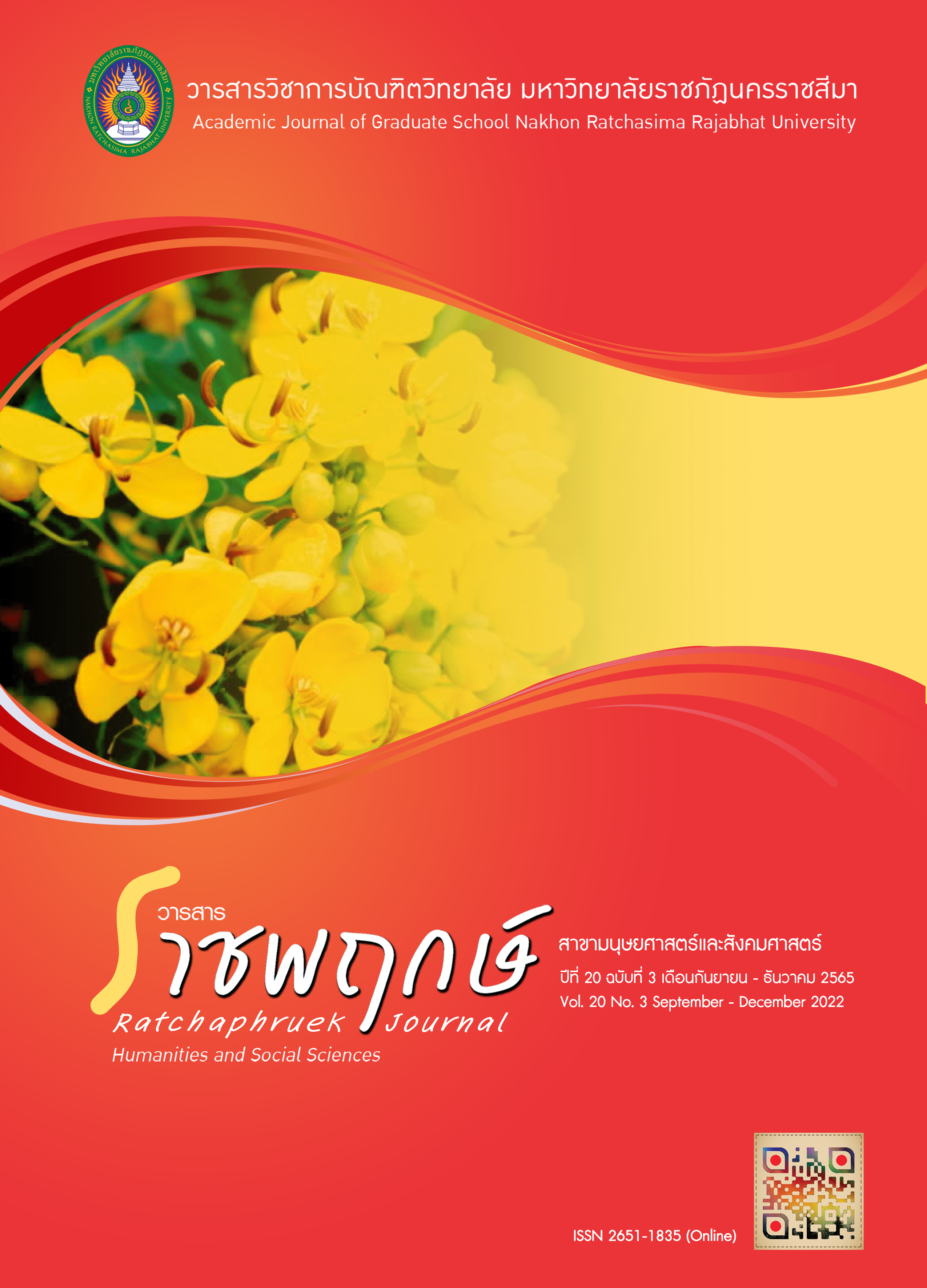EPCA Model to Enhance Teachers’ Professional Competencies in Curriculum and Learning Management for Students Studying in Bachelor Degrees in Education Program
Main Article Content
Abstract
The objectives of this research were to: 1) develop instructional model to enhance teachers’ professional competencies in curriculum and learning management for students studying in bachelor degrees in education program and 2) trial the instructional model to enhance teachers’ professional competencies in curriculum and learning management for students studying in bachelor degrees in education program. The processes of research were conducted two phases. The target group of first phase was 3 educational experts. The target group of second phase was 29 sophomore students who registered for the course 102207 learning management methodology, second semester of 2021 academic year, by cluster random grouping. The research tools were the learning management model assessment form, the learning management plan using the EPCA model, and the teachers’ professional competencies test. Data analysis were percentage, mean, standard deviation, t-test and gain score. The results revealed that 1) EPCA model to enhance teachers’ professional competencies in curriculum and learning management was appropriately at the highest level, and 2) students who have studied using EPCA model had teachers’ professional competencies as following, teachers’ professional competencies after learning was significantly higher than before at the .05 level, and teachers’ professional competencies after learning was significantly higher than 70% criterion at .05 level.
Article Details

This work is licensed under a Creative Commons Attribution-NonCommercial-NoDerivatives 4.0 International License.
References
กมลฉัตร กล่อมอิ่ม. (2564). การพัฒนารูปแบบการจัดการเรียนรู้ฐานสมรรถนะประยุกต์ใช้ศาสตร์พระราชาบนพื้นฐานอัตลักษณ์พื้นถิ่นเพื่อเสริมสร้างสมรรถนะวิทยาการจัดการเรียนรู้ สำหรับนักศึกษาวิชาชีพครู. วารสารสันติศึกษาปริทรรศน์ มจร, 9(6), น. 2554-2569.
กิตติชัย สุธาสิโนบล. (2560). จิตสำนึกและจรรยาบรรณวิชาชีพครู. กรุงเทพฯ: คอมเมอร์เชียลเวิลด์ มีเดีย.
บุญชม ศรีสะอาด. (2554). การวิจัยเบื้องต้น (พิมพ์ครั้งที่ 9). กรุงเทพฯ: สุวีริยาสาส์น.
ประพันธ์ศิริ สุเสารัจ. (2556). การพัฒนาการคิด (พิมพ์ครั้งที่ 5). กรุงเทพฯ: 9119 เทคนิคพริ๊นติ้ง.
พิมพันธ์ เดชะคุปต์ และพรทิพย์ แข็งขัน. (2551). สมรรถนะครูและแนวทางการพัฒนาครูในสังคมที่เปลี่ยนแปลง. กรุงเทพฯ: สำนักงานเลขาธิการสภาการศึกษา กระทรวงศึกษาธิการ.
วาสนา กีรติจำเริญ และสุภาวดี วิสุวรรณ. (2565). การจัดการเรียนรู้เพื่อพัฒนาสมรรถนะวิชาชีพครูด้านการบริหารหลักสูตรและการจัดการเรียนรู้ด้วยการสอดแทรกสมรรถนะสำคัญ. วารสารชุมชนวิจัย มหาวิทยาลัยราชภัฏนครราชสีมา, 16(3), น. 70-81.
ศิริชัย กาญจนวาสี. (2557). การคำนวณคะแนนพัฒนาการ (Gain scores). สารสมาคมวิจัยสังคมศาสตร์แห่งประเทศไทย, 1(1), น. 1-20.
สมบูรณ์ ตันยะ. (2555). วิธีวิทยาการวิจัยทางการศึกษา. นครราชสีมา: คณะครุศาสตร์ มหาวิทยาลัยราชภัฏนครราชสีมา.
สำนักงานเลขาธิการสภาการศึกษา. (2563). การจัดการเรียนรู้ฐานสมรรถนะเชิงรุก. กรุงเทพฯ: 21 เซ็นจูรี่.
หาญศึก เล็บครุฑ. (2557). การพัฒนารูปแบบการเรียนการสอนเพื่อส่งเสริมสมรรถนะวิชาชีพครู ด้านการวัดและประเมินผลการศึกษา. การประชุมวิชาการครุศาสตร์อุตสาหกรรมระดับชาติ ครั้งที่ 7 สืบค้นเมื่อ 6 พฤศจิกายน 2557 จาก http://ncteched.fte.kmutnb.ac.th/
nc7/NCTechEd07/NCTechEd07TEM04.pdf
อิสรา พลนงค์ และวาสนา กีรติจำเริญ. (2564). การพัฒนารูปแบบการสอนตามแนวสะตีมศึกษาสำหรับการเสริมสร้างทักษะความคิดสร้างสรรค์ของนักเรียนในโรงเรียนประถมศึกษาขนาดเล็ก. วารสารราชพฤกษ์, 19(3), น. 119-129.
Joyce, B. and Weil, M. (2009). Models of teaching. New Jersey: Prentice-Hall.


